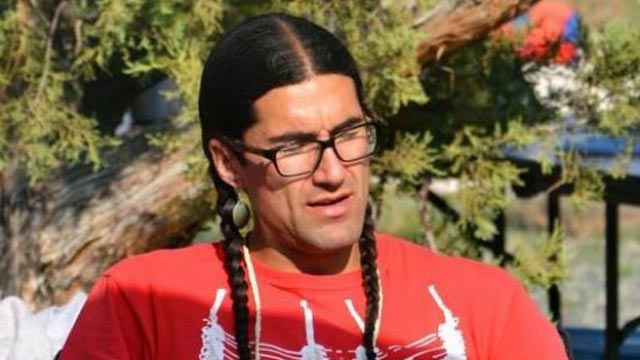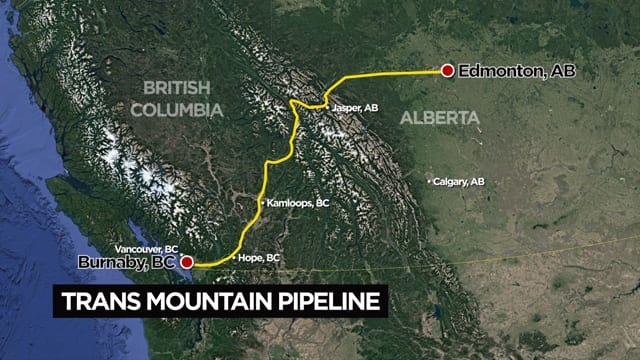The debate over Kinder Morgan’s Trans Mountain pipeline expansion is breaking down relationships between Indigenous groups, according to the chief of one B.C. First Nation.
“It’s another colonial machine that’s driving us apart from one another,” Bonaparte Indian Band Chief Ryan Day told HuffPost Canada in an interview.

While Kinder Morgan touts its 43 mutual benefit agreements with Indigenous groups in B.C. and Alberta, six First Nations fight the project’s approval in court.
Day says he’s staying out of the debate.
The pipeline won’t cross any of his reserve lands. However, Bonaparte is one of 17 bands that make up the Secwepemc nation, and for 518 km — or more than half of the project’s route — the new pipeline will go through Secwepemc’s traditional territory.
“We are downstream from the pipeline, so it certainly will impact us … However, we’ve kind of left it up to directly affected upstream folks to engage more directly,” Day said.
He said he would have liked to engage with Kinder Morgan, but his band doesn’t have the capacity to do so.
“That’s where we’re at and I think that’s where a lot of communities are at. The bottom line is that we’re dealing with poverty.”
For some First Nation leaders, Kinder Morgan’s project is seen as an opportunity to alleviate some of that poverty.
Cheam chief says project will create jobs, business partnerships
Ernie Crey, chief of Cheam First Nation, has become one of the project’s most vocal supporters. His nation of 547 people has an unemployment rate of 14.3 per cent, nearly double the B.C. average.
He said the pipeline will bring a laundry list of opportunities for his Stó:lō nation: cash, which can be invested in future business projects; the opportunity to work with nearby companies to bid on contracts during construction; and work experience that members can bring with them to future jobs.
“The benefits and the money that will flow from that will put this community in good stead for generations to come,” Crey told HuffPost Canada in an interview.
Crey’s angry about the way some environmentalists and Indigenous associations have portrayed nations that signed agreements with Kinder Morgan.
“If you were to believe some of these green groups and their allies, you would think that Ian Anderson, the head of Kinder Morgan Canada, drove out on to this reserve, found me, rolled down his car window, handed a cheque to me and said, ‘There you go, chief. Now I do enjoy your support for my pipeline, right chief?’” Crey said.
In reality, he said, his council worked for over a year to negotiate a deal that would truly benefit its members.
“The negotiations lasted a long time. They were exhaustive and exhausting and challenging for our young council here. But they went toe-to-toe with Ian Anderson’s negotiators and they came up with an agreement that’s going to mean a world of difference to this community.”
While Crey says the project will be an economic game-changer, other chiefs worry it’ll be an environmental disaster.
‘Drastic risk’ to Coldwater’s drinking water
Coldwater Indian Band is one of the nations challenging the National Energy Board’s (NEB) approval of the project in court. If Coldwater’s challenge is successful, the pipeline’s approval will be set aside. Officials will then have to backtrack and re-do some consultations.
The existing pipeline, built in the 1950s, runs right through Coldwater’s reserve. Kinder Morgan wants to build the new pipeline to the east of the reserve, through the nation’s traditional Nlaka’pamux territory, including areas that Coldwater says hold spiritual and cultural significance.
This route will also see pipeline built right over an aquifer which provides drinking water for nearly half of the nation’s 850 members, according to a memorandum of fact filed by Coldwater’s lawyers.
“Trans Mountain failed to identify, and was unaware of, the Aquifer when it selected this route and accessed the environmental effects of the Project,” the document states. “The New Pipeline represents a risk to the Aquifer from leakage and a drastic risk if there were to be a rupture of the pipeline. This is a major unreconciled issue for Coldwater that causes its people a high level of anxiety.”
Coldwater’s chief, Lee Spahan, has indicated he has no intention of signing a deal with the Texas-based company.
“If we have to, it’ll be our Standing Rock,” he told APTN. “For us it’s not about the politics, but the future of our community and ensuring we have access to clean, safe water.”
This story was produced as part of #TrackingTransMountain, a collaborative reporting project from The Discourse, APTN News, and HuffPost Canada that aims to deepen the reporting on Indigenous communities affected by Kinder Morgan’s Trans Mountain Expansion Project.
Explore the interactive database here:











